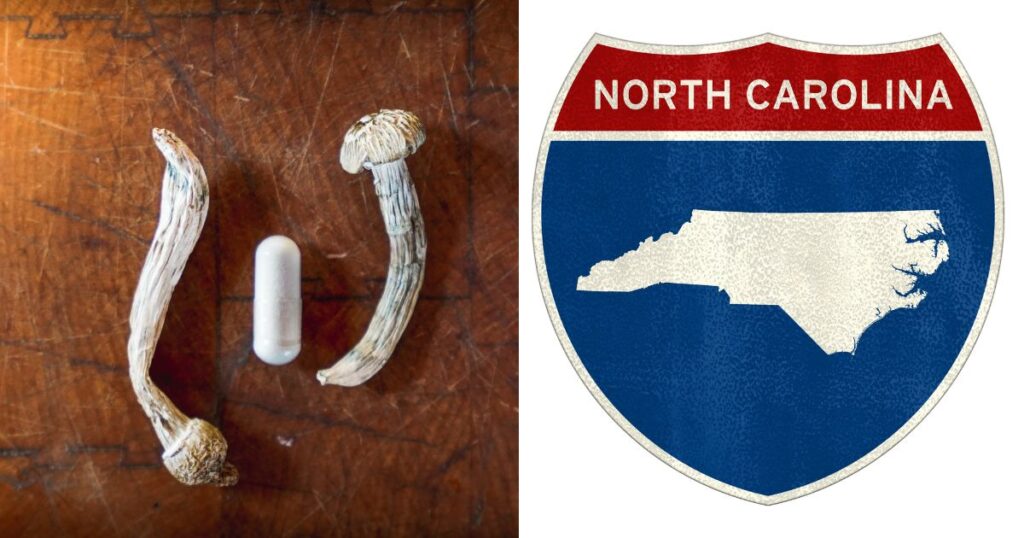North Carolina lawmakers are taking a step toward addressing the state’s mental health crisis by proposing an innovative approach that has been gaining national and global attention. Senate Bill 568, introduced by Senators Sophia Chitlik (D) and Bobby Hanig (R), seeks to create the North Carolina Mental Health and Psychedelic Medicine Task Force. A bipartisan effort aiming to explore the therapeutic potential of psychedelic medicine, using new medical innovations to improve public health and support local economic growth.
Shining a Light on Mental Health and Psychedelic Medicine in North Carolina
As first reported by Marijuana Moment, the proposed task force, under the jurisdiction of the North Carolina Department of Health and Human Services (DHHS), would be charged with a series of critical responsibilities. Its main purpose is to examine how psychedelic therapies could address mental health challenges faced by residents, particularly veterans and those who have experienced complex trauma.
Senator Chitlik stated that the bill is “both a mental health bill and also a step to economic development for our region,” emphasizing the importance of a forward-thinking approach to address ongoing mental health needs. She told Marijuana Moment, “I want to make sure that we’re both proactively supporting the mental and physical health of our veterans and other people who have experienced complex trauma and encouraging research and development.”
While psychedelic therapies remain federally classified as Schedule I substances, ongoing reclassification efforts and emerging clinical research highlight their potential benefits for mental health. This task force reflects an effort in North Carolina to prepare for potential federal reclassifications and the eventual legalization of these treatments.
Responsibilities of the Task Force
The proposed task force would evaluate the feasibility of psychedelic medicine to address the state’s mental health needs across several dimensions. According to the bill, its primary areas of focus would include.
Assessing Therapeutic Use
The task force will explore how psychedelic medicine can be utilized to mitigate the mental health crisis. North Carolina’s rates of suicide, PTSD among veterans, and substance use disorders have prompted growing interest in treatments like psilocybin and MDMA, which have shown promising results in clinical trials.
Addressing Equity and Accessibility
The initiative emphasizes eliminating barriers to access. Recommendations will be made on equitable access to these therapies, ensuring that underserved populations—including minority communities, Native populations, and survivors of trauma—are prioritized.
Establishing Licensing and Insurance Protocols
Should the U.S. Food and Drug Administration (FDA) approve future psychedelic therapies, the task force will recommend licensing frameworks and insurance requirements for practitioners administering these treatments in the state.
Regulatory and Legal Pathways
The group will also review and recommend regulatory strategies related to the possible legalization of psychedelic medicine. Additionally, the task force will consider potential implications for public health, particularly as it relates to the regulation and introduction of these substances into medical environments.
If created, the task force would include 13 members, such as representatives from state departments of health, veterans affairs, and commerce, along with healthcare experts, a tribal representative from the Eastern Band of Cherokee Indians, who are no strangers to being the front runners of plant plant medicine in the state, as they were the first medical and recreational dispensary in North Carolina, despite state laws.
Political Strategies to Foster Collaboration
The bill deliberately uses the word “may” instead of “shall,” signaling that the Department of Health and Human Services is encouraged—but not required—to establish this task force. Senator Chitlik told Marijuana Moment that this wording was intentional, aiming to make the measure “more bipartisan and more possible to implement.”
By allowing flexibility, the bill avoids upfront funding commitments while demonstrating that the General Assembly is serious about evaluating options for improving mental health care using scientific and therapeutic innovations. “This serves as a signal to state agencies that the General Assembly wants more information about this, and we’re encouraging them, proactively, to explore that,” Chitlik said.
Potential Impacts on North Carolina’s Veterans
One of the bill’s most compelling aspects is its focus on veterans, a group disproportionately affected by PTSD and other complex trauma-related conditions. Senator Chitlik believes that “caring for our veterans is about as bipartisan and universal an issue as you can possibly get—not just in our state, but in our country.”
Psychedelic clinical research has frequently highlighted how therapies like psilocybin and MDMA-assisted psychotherapy significantly reduce PTSD symptoms in military veterans. By exploring these treatments now, North Carolina can position itself as a leader in compassionate, evidence-based care for veterans.
“When people started to hear directly from veterans who have experienced this trauma and who are experiencing this healing, I really believe that hearts and minds change,” said Chitlik.
While this initiative draws attention to North Carolina’s local challenges, it aligns with a growing national and international trend of investigating psychedelics as therapeutic tools. Oregon, Colorado, and California have already redefined the legal and therapeutic use of psychedelics. North Carolina’s attempt could place the state on the map as a research and policy leader in the Southeast.
Moving Forward with the North Carolina Mental Health and Psychedelic Medicine Task Force
If the Senate passes Bill 568 and convenes the task force, it must submit its findings, including proposed legislation, to the General Assembly by December 1, 2026. Its effectiveness will depend on the collaborative efforts of its diverse members, ongoing federal advancements in psychedelic research, and growing public support for alternative mental health treatments.
Ultimately, this initiative demonstrates how North Carolina could prepare itself for a future where psychedelics become a mainstream, medically approved solution for mental health care—a field at the intersection of science, policy, and humanity.

















